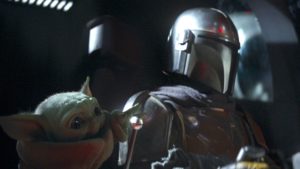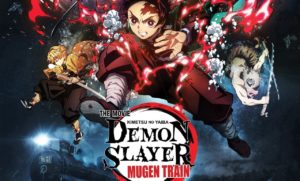
Spring is here, which is almost unfortunate given the great crop of shows from the previous anime season. I’ve been watching seasonal anime for the last few years, but due to the exceedingly high quality of several shows, and one in particular, this is likely the single most impressive season I’ve seen as it aired thus far. We had action spectacle in spades, with the antics of JoJo Part 5 and Dororo, conveying absurdity and tragedy respectively. The Promised Neverland offered a tense thriller with an endless supply of twists and turns, while on the opposite end of the spectrum Run with the Wind’s second half cashed in on its naturalistic character building with a cathartic run of triumphs. Kaguya-sama: Love is War adapted the beloved manga with an expressionistic verve, the visual comedy underpinning the frequently hilarious writing.
And lastly, Mob Psycho II provided what was likely the single best season of an anime I’ve ever watched as it aired, demonstrating consistent comedy, dramatic turns that naturally extend from the character’s and their ideas, and some of the most impressive TV produced animation we’re likely to ever see. We truly are lucky to have this union between ONE and Studio Bones. And without further ado, let’s run down five shows from the Winter 2019 season that I would recommend.
5. Kaguya-Sama: Love is War
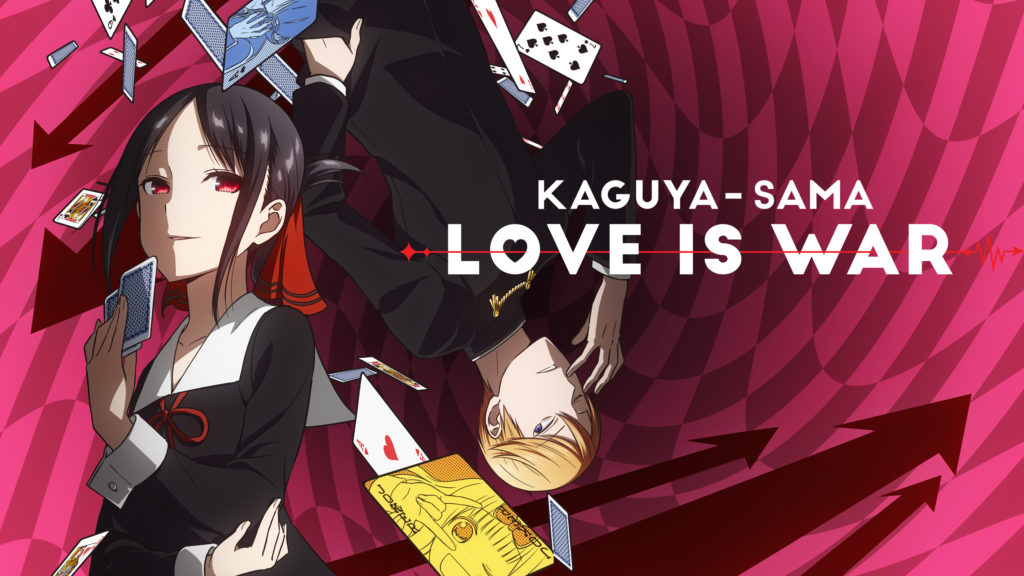
What happens when you combine the trappings of a rom-com with ridiculously complicated tactical strategizing? And if this combination of disparate elements is produced by a splurging A-1 Pictures with the director of the masterful Shouwa Genroku Rakugo at the helm? The result is Kaguya-sama: Love is War, a consistently hilarious will-they-won’t-they that conveys is absurd humor through comedically oversold compositions. We follow two teens, Kaguya and Shirogane, the President and Vice President of a prestigious high school. They both have strong feelings for the other, but due to their immense pride and social awkwardness, they instead conspire to construct convoluted means of getting the other to confess their feelings first. The inner machinations of their overthinking are expressed in detailed and loud layouts that build up the punchlines to with consistent hilarity.
While shows that are built around one fundamental joke can grow stale, the side characters, and shift towards more dramatic character study moments fend off the redundancy of the premise. Love is War manages to find the inherent ridiculousness in the awkward missteps of these kids, poking fun at their misfortunes without seeming mean spirited. Shirogane’s training arc with Fujiwara is one such highlight, the convincing emulation of aspects of sports anime, undercut by his cartoonish incompetence at volleyball. The sakuga in scenes like this feels reminiscent of shows like One Punch Man, using overdramatic angles and speed lines to amplify the melodramatic tone. While there are some missteps like the creepy “I slept in your bed” 2 episode arc, this is a comedy that generally cares enough about the psychology of its characters, making the more dramatic moments feel like natural extensions of the gags.
4. The Promised Neverland
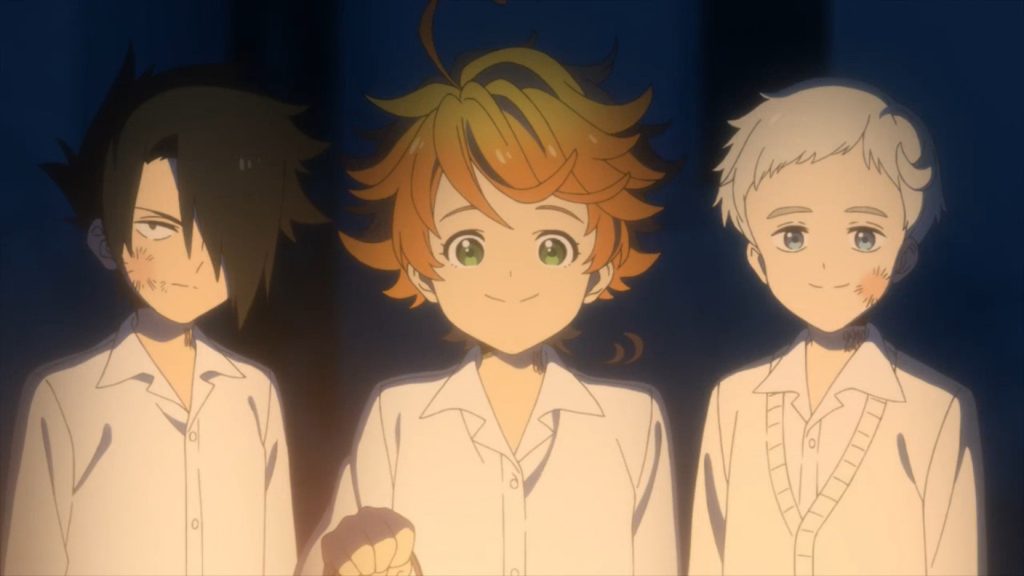
While the grim twist of The Promised Neverland’s premise could have easily begotten an overbearingly bleak melodrama, it instead balances its darker tendencies with an affirmation of the strength of the human spirit. I’ll avoid spoiling the setup for this story, but we follow Norman, Ray, and Emma, three kids who live at an idyllic orphanage. However, things are not as they seem, and the trio must overcome stacked odds to manufacture an escape from their grisly fate. Their complicated layers of plans and back-up plans are presented in the form of an unrelenting thriller, in which the tremendous stakes and paranoia-inducing cinematography elicit constant tension.
While the 3D animated halls of the orphanage initially seemed like a downside, this choice allowed for a plethora of unnerving tracking sequences, and first-person shots that poked around corners, implying the constant presence of enemies. But this built up tension would mean nothing if we didn’t have any attachment to our characters or what they stand for. Luckily, Emma is the bastion of humanity that a story with this much despair needs, her empathy and desire to save her family fueling the drama, as well as offering another complexity in the plans with her co-conspirators. Admittedly the tension eases up slightly in the middle of the production, but the final episode is a stunner that fully dramatizes the cruelty of this dystopian system while also building on the nuanced planning that came before it.
3. Dororo
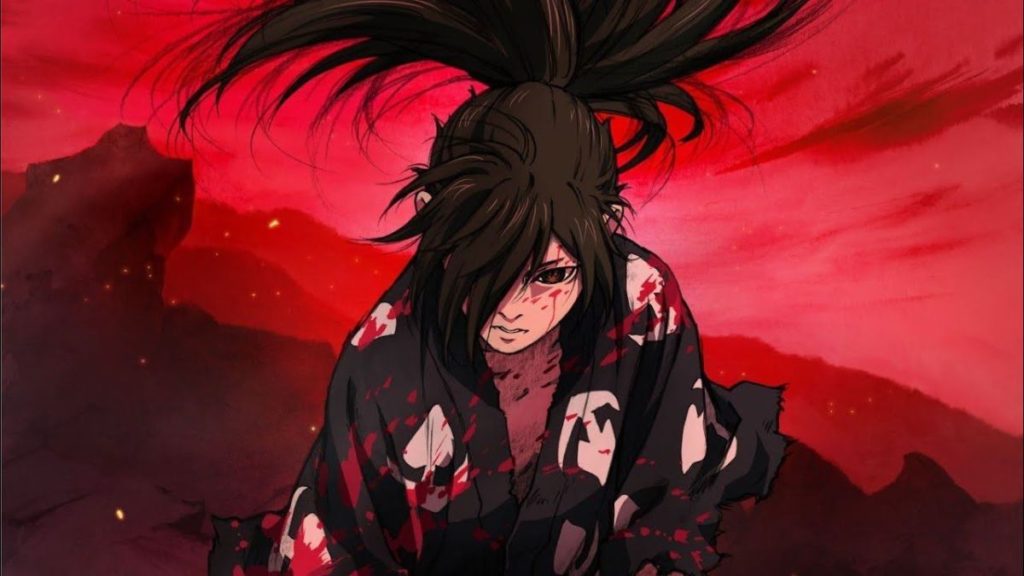
Chanbara stories can generally go one of two ways. Simply put, they can either glorify the exploits of war or condemn them. Dororo falls squarely into the camp of the later, depicting the story of an orphaned child Dororo and a cursed warrior Hyakkimaru, who must kill demons to get parts of his bodies back. Set against the backdrop of the war-torn Sengoku period, the effects of this bloodshed can be felt in every facet of the land. Parentless children roam the streets, amputees are common, and the battlefields are soaked red. By largely focusing on the common people affected by the constant tragedy and heartbreak of the Warring States period, we see the horrors of this conflict first hand.
But it’s not all a dismal affair. Dororo and Hyakimmaru experience small victories along the way, while Hyakimmaru’s demon-slaying earns him parts of his body back. The bond between these two grows, as Hyakimmaru becomes increasingly human. The two even help some escape the strangling presence of warlord’s power struggles, making something of a difference in the sea of violence. In terms of production, MAPPA has managed to consistently animate intricate action sequences that are explosions of stylistic motion. The demon infused abilities of Hyakimmaru make for bombastic exchanges with his hellish pray. With another twelve episodes left in its runtime, Dororo looks like one of the most impressive action series in recent memory, illustrating tragedies and triumphs in this fantastical depiction of feudal Japan.
2. Run with the Wind (Second Cour)

I’m glad that everyone’s favorite show about sports boys ended in such a triumphant and consistent fashion. The last half of Run with the Wind managed to both concisely convey the emotional growth of its characters, while also delivering a thrilling conclusion to the Kansei University Long Distance Team’s run at the Hakone Ekiden. Here the focus was less on winning a literal competition, and more about how the members of the team use their experience with running to move forward as people. Levying its strength for Linklater-esque banter with well-realized portrayals of its cast, the final few episodes were a cathartic and gorgeously animated visual feast.
While long-distance running doesn’t make for the most inherently exciting material, the actual marathon of the Hakone Ekiden was a non-stop barrage of fascinating internal monologues and ruminations that naturally extended from each character’s internal conflicts previously introduced over the show’s twenty-three episodes. We witness a gauntlet of internal doubt over notions of failing to fit in, familial reconciliation, overcoming physical shortcomings, and contemplation of the nature of running in general. And yet, instead of feeling didactic or contrived, these thoughts feel well-considered, the team’s mutual experience of participating in this crazy endeavor allowing each of them to face their pasts and their own misgivings. All things considered, Run with the Wind is an excellent character-drama that also happens to convey the purifying catharsis of running.
1. Mob Psycho 100 II
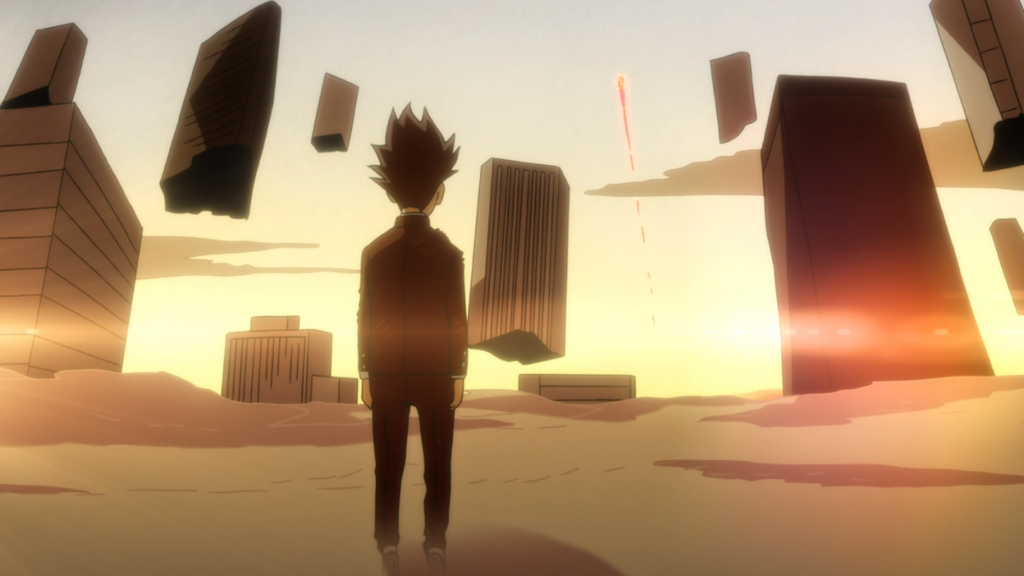
The first season of Mob Psycho 100 had one of the best twelve episode runs in recent memory. It told the story of a middle-school aged esper, Mob, whose destructive telekinetic powers offered fodder for discussion about the nature of natural talent and power. Studio Bones knocked their adaptation of ONE’s work out of the park with insane cuts from industry giants like Yutaka Nakamura and utilized a mix of different mediums and art styles. And it was all tied together by a combination of satirical comedy, and the wholesome warmth of its central relationships.
But now, three years after the first run, Studio Bones has managed to one-up themselves. The second season of Mob Psycho retains everything that is great about the first while levying Mob’s continual character growth to satisfying effect. Season two is a whirlwind of showstopping episodes, many of which are enthralling for entirely unique reasons. We start with a one-off romance story that manages to perfectly encapsulate how far our protagonist has come since the start of the first season. Then we move onto a brutal psycho-drama, as a malevolent psychic attempts to break down the inner-reaches of Mob’s soul, claiming that he only stumbled upon a happy life by chance. After we delve into the life of Mob’s mentor, Reigen, witnessing his ennui and discontent firsthand. And it all culminates in a massive brawl as a shadowy organization makes steps towards their ultimate plan of world domination.
While most thirteen episode seasons made up of this many disparate plot arcs would feel discombobulated and unfocused, here each sub-story is unified thematically. They all deal with notions of self-image, specifically in regards to talent, and are bound by an empathetic worldview that always considers the perspective of even its most dismal antagonists. Director Yuzuru Tachikawa finds a balance between the shows states of comedy, action, and drama, mixing all three into every single episode, and sometimes even delivering on each in a single line or action.
And of course, then there’s the absurd fluidity, originality, and range of the animation. Theses telekinesis infused esper battles were storyboarded and brought to life by some of the most talented individuals in the industry, including Hakuyu Go, who directed the visual feast of this season’s fifth episode. Bones continues to push the boundaries of not only television anime but of action choreography in general with frenetic but followable sequences of carnage.
Mob Psycho 100 II is an instant classic. It levies the comedic sensibilities and character writing of ONE’s original webcomic with a litany of the most talented animators and producers in the world. And most saliently, is a show that is a beacon of optimism. Because according to Mob Psycho the world can sometimes be cruel and unforgiving. But it can also be kind, supportive, and allow us to undergo genuine change for the better.

